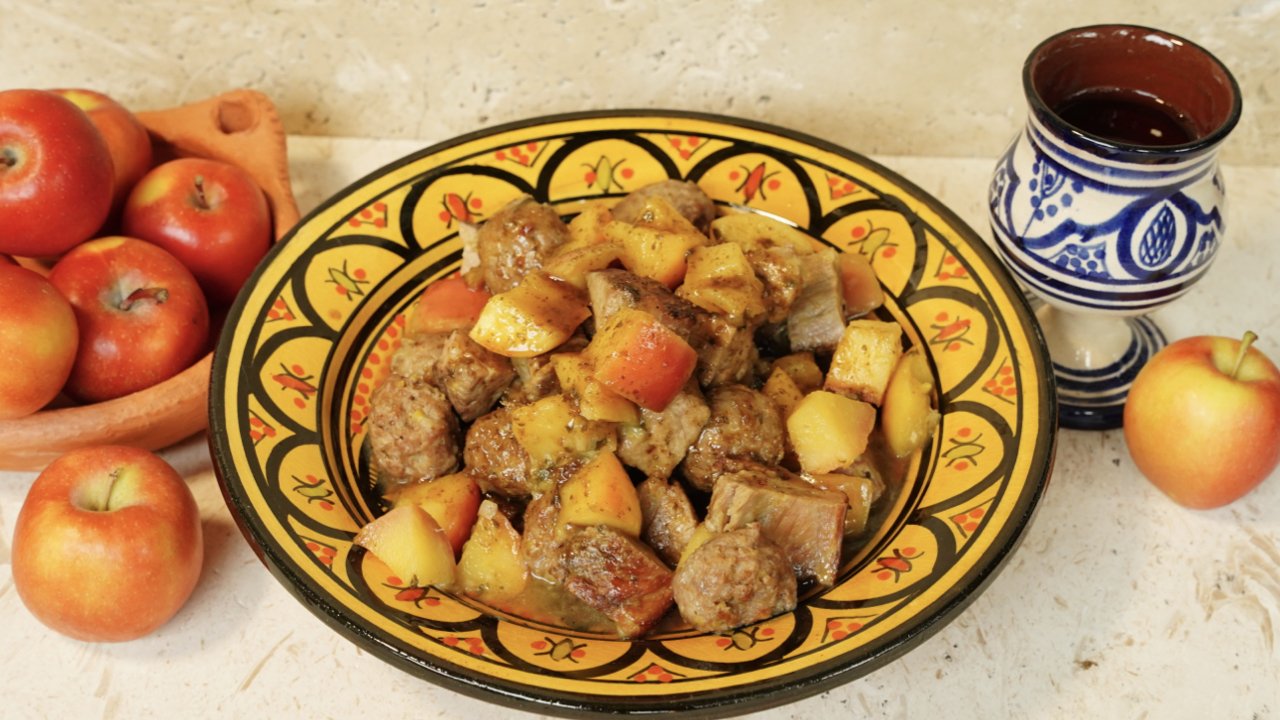Roman Pork with Apples
Roman pork and apples served with a fragrant sauce
City/Region: Rome | Britain
Time Period: 1st Century
In the Roman military, a common punishment was to receive a ration of barley rather than the traditional wheat or rye. But this dish of pork and apples definitely was no punishment but a reward (and likely only enjoyed by the officers). Using ingredients that would have been available to Roman soldiers in Britain, minutal matianum, as it’s called in Apicius, is the most delicious ancient Roman food I’ve made so far.
“Put oil, garum, stock, chopped leek and cilantro and small ground meatballs in a pot. Chop previously cooked shoulder of pork with skin into cubes. Cook all together. Half-way through cooking add cored and diced Matian apples. While it cooks, grind pepper, cumin, cilantro and coriander seed, mint, and silphium root, pour in vinegar, honey, garum, defrutum, and some of the cooking liquid. Adjust the flavors with vinegar. Bring to a boil. Add broken tracta to thicken. Sprinkle pepper and serve. ”
Ingredients:
Roasted Pork
- Pork shoulder (you'll need 1 lb (450 g) of cooked pork for this dish)
- Olive oil
- Salt
- Pepper
- Honey
Pork and Apples
- 1 tablespoon olive oil
- 3/4 lb (340g) ground pork or beef, shaped into 1” balls
- 1 cup chopped leek
- 1 cup (235ml) chicken stock, plus extra as needed
- 2 teaspoons garum*
- Small handful chopped cilantro
- 1 lb (450g) roasted pork, cut into cubes
- 1 lb (450g) sweet apples, cored and cut into about 1” pieces
Sauce
- 1 teaspoon cumin
- 2 teaspoons chopped cilantro
- 1 tablespoon coriander seeds
- 2 teaspoons chopped mint
- 4 long peppers* or 1 tablespoon of peppercorns
- 1/2 teaspoon asafoetida*
- 1/4 cup (60ml) white wine vinegar
- 2 tablespoons honey
- 1 teaspoon garum
- 1/4 cup (60ml) defrutum*
- 1/4 cup (60ml) cooking liquid from the pork and apples
- 2 teaspoons starch or cornflour
*See notes below.
Instructions:
- For the roasted pork: Preheat the oven to 450°F (230°C). Line a baking sheet with foil, then place a roasting rack on top of it.
- In a small bowl, mix the olive oil, salt, pepper, and honey. There should be enough to coat the pork roast. Adjust the amounts to your liking.
- Brush the olive oil mixture onto the pork, then roast for 15 minutes.
- Lower the temperature to 275°F (135°C) and cook for about an hour per pound, or until the internal temperature reaches at least 165°F (74°C). Take the roast out and let it rest for 15 minutes.
- Cut 1 lb (450 g) of the roast into bite-sized cubes for this dish. You can make the roast for one meal and save the 1 lb to make this the next day.
- For the pork and apples: Heat the olive oil in a large pot over medium heat, then add the meatballs and leeks and cook for 8 to 10 minutes, or until they start to brown.
- Deglaze the pot with the chicken stock and garum. Toss in the cilantro and roasted pork. Add enough additional chicken stock so that it covers the bottom of the pot.
- Simmer for 15 minutes, adding more stock if necessary.
- Add the apples, then cook for another 20 minutes or until the meatballs are fully cooked.
- For the sauce: Grind the spices and herbs with a mortar and pestle, then put them in a saucepan with the liquid ingredients. Stir together and bring to a gentle boil over medium heat.
- Mix the starch with a little water, then add it to the sauce. Simmer for a couple of minutes until it thickens.
- To serve: Dish the pork and apples into a bowl, drizzle with the sauce, and serve it forth.
Notes
Garum was a fermented fish sauce that was used in a lot of ancient Roman cooking. You can buy a modern equivalent or use an Asian fish sauce.
Long pepper was very popular in ancient Rome. It's hotter than black pepper and has a more aromatic, almost flowery quality to it that's wonderful.
Asafoetida was Rome’s pungent replacement for their beloved silphium and imparts a wonderful garlicky umami flavor when cooked. Be sure to store it in a sealed container (or two) or your whole pantry will smell sulfurous. You can find it at Indian markets or at the link below.
Defrutum was a 1/3 reduction of grape must and is sweet and delicious. Today saba is pretty much the same thing. It can be expensive, so you can reduce some grape juice instead. It won't be as complex as saba, but it will work just fine.
Link to garum: https://amzn.to/3ulTKKW
Link to long pepper: https://amzn.to/3ZfRLDR
Link to asafoetida: https://amzn.to/3R2zRRZ
Link to saba: https://amzn.to/3JGkbyK
Some links on this site are affiliate links. If you buy something through them, it does not cost you anything more, but we will get a small commission which helps keep the site up and running. Thanks!


